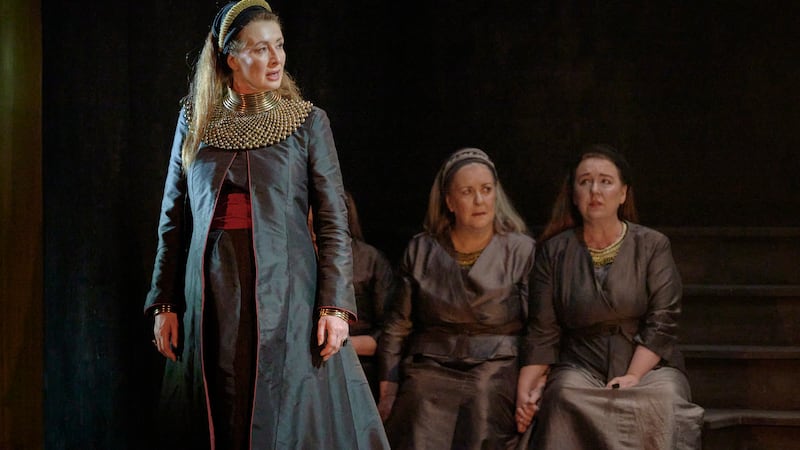G
o mbeannaí Dia daoibh agus bhur gcéad míle fáilte isteach chuig the Bluffer’s Guide to Irish.
Well, it’s time for another irregular verb, folks and we’re coming to the word tar meaning come.
That’s the easy part over!
In the present tense, you would say tagaim - I come or tagann tú/sé/sí/muid/sibh siad - you/he/she/we/you (pl)/they come.
The negative is ní thagaim - I don’t come, ní thagann tú/sé/sí etc you/he/she doesn’t come and when asking a question or using indirect speech it’s an/go/nach dtagaim/dtagann etc.
Tagann na géanna anseo gach bliain - the geese come here every year for example or tagann olpóg orm go minic - I often get the flu. (In Irish, diseases come on you).
However, older people or native speakers in Ulster also use the word tig for come.
This gives you tigim - I come and tig sé/sí/muid/sibh/siad - he/she etc, comes.
Tig sé gach Luan - he comes every Monday.
Phew! There’s a lot to learn there but if you just look at verbs in the present habitual - things you do on a regular basis - as patterns, you’ll see the I words end in -aim or -im and all the others, you, he, she and so on, end in -ann etc.
So let’s move onto the past tense.
The word came is also used in many different settings, so you’ll need to learn tháinig mé/tú/sé/sí etc - I, you, he/she etc. came you: ní tháinig mé/tú etc and an/go/nach dtáinig mé/tú etc.
Tháinig Séamai isteach go mall - Seamy came in late.
An dtáinig Róise chun an bhaile aréir? - Did Róise come home last night? are a couple of sentences that might come in handy.
The future tense now brings us to the most common use of the verb to come.
The future is tiocfaidh mé/tú etc - I, you etc. will come.
It’s weird the way some words make their way into a language. Tiocfaidh is famous the world over as in the phrase tiocfaidh ár lá - our day will come.
It has now metamorhosed into the word chucky or its dinimutive chuck meaning a supporter of Irish republicanism.
However, the language is politically neutral and it is easy enough to use the negative, ní thiocfaidh bhur lá - your day won’t come.
And for the questioning
Chuck who is wondering if the days of a 32-county socialist republic is just a pipe dream can ask himself “an dtiocfaidh ár lá? Will our day come?
Now the best way to get through all the info above is by treating all the irregular verbs as mantras.
You can say over and over again, tagaim - ní thagaim - an/go/nach dtagaim until it becomes second nature to you when you come to make up sentences.
Then tháinig mé, ní tháinig mé, an/go/nach dtinig mé. Just repeat it until it gets stuck in your brain.
And finally, there is tiocfaidh mé, ní thiocfaidh mé, an/go/nach dtiocfaidh mé.
You can just use days of the week and ask people questions until you get a grasp of the verb and its used.
But now the time has come for a bit of a rest!
CÚPLA FOCAL
tagaim(tagim) - I come
tagann tú/sé/sí/muid/sibh siad(tagan too/shay/she/midge/shib/shade) - you/he/she/we/you (pl)/they come
ní thagaim (nee hagim) - I don’t come
ní thagann tú/sé/sí etc.(nee hagan too/shay/she etc) - you/he/she doesn’t come
Tagann na géanna anseo gach bliain(tagan na gayana anshaw gakh bleean) - the geese come here every year f
tagann olpóg orm go minic (tagan ulpawg gaw minik orim) - I often get the flu
tigim(chigim) - I come
tig sé/sí(chig shay/she etc) - he/she etc, comes
tig sé gach Luan(chig shay gakh looan) - he comes every Monday
tháinig mé/tú etc. (haneek may.too) - I, you, etc. came
ní tháinig (nee haneek)- didn’t come
an dtáinig mé/tú (un daneek may/too) - Did I, you come
Tháinig Séamai isteach go mall(haneek shaymay istyakh gaw maal) - Seamy came in late
An dtáinig Róise chun an bhaile aréir?(un daneek rawsha na walla a-rare) - Did Róise come home last night?
tiocfaidh mé/tú etc(chucky may/too) - I, you etc.
tiocfaidh ár lá(chucky aar laa) - our day will come.
ní thiocfaidh bhur lá(nee hucky wur laa) - your day won’t come
an dtiocfaidh ár lá? (un jucky aar laa)- Will our day come?


